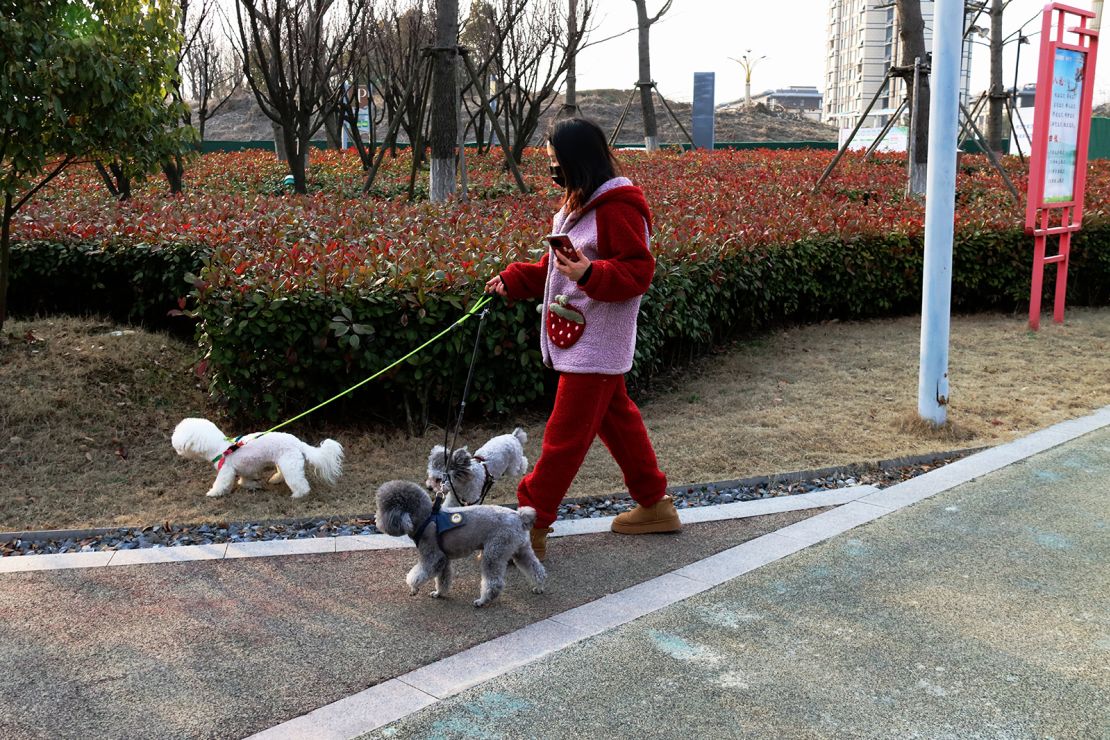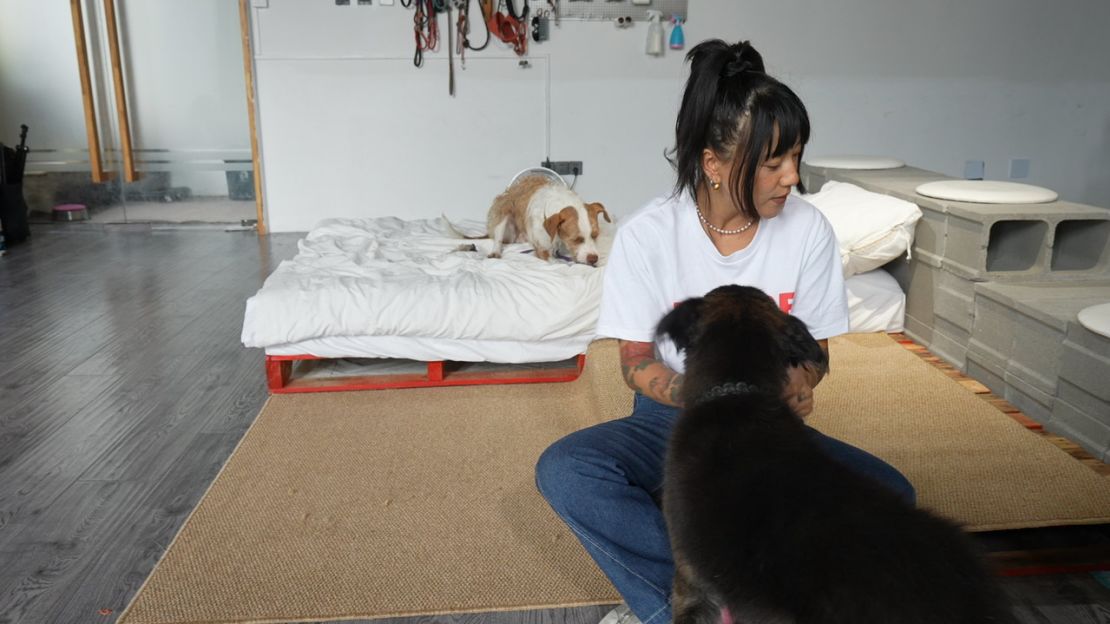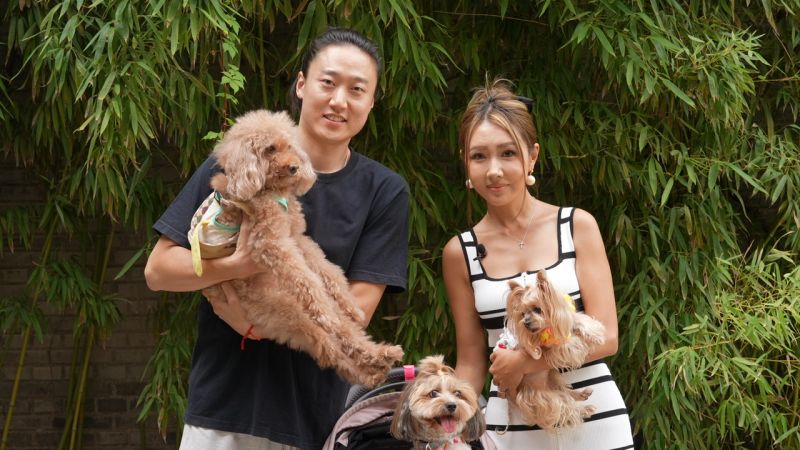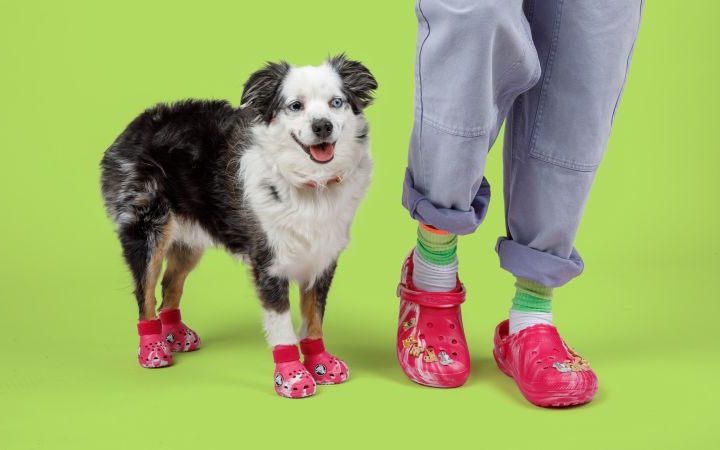Editor’s Note: Sign up for CNN’s Meanwhile in China newsletter which explores what you need to know about the country’s rise and how it impacts the world.
Married for seven years, Hansen and his wife Momo care for six little ones at their apartment in downtown Beijing.
But they adopt a slightly different parenting routine from your typical mom and dad: They play fetch with them and take them out for daily walks.
These little ones are not their offspring, but “fur babies,” or “mao hai zi,” in Chinese, and the couple loves them so much they refer to them as “our daughters, our sons.”
“They are all part of our family. We are one big family,” said Momo, who gave only her nickname for fear that she may get into trouble with authorities for openly speaking about her choice of lifestyle – one that is at odds with China’s effort to boost birth rates.
China is grappling with a fast-aging population and shrinking labor force after decades of enforcing a one-child policy. The country is also one of the most expensive places in the world to raise a child in relative terms, easily beating Australia and France, according to a study from the Beijing-based YuWa Population Research Institute earlier this year.
After ending the one-child policy in 2016 and making yet another major birth policy shift in 2021, the government now wants couples to have three children. But Beijing hasn’t been as successful in driving up births as it was in deterring them.
Many Chinese couples like Hansen, 36, and Momo, 35, are not sold on children. Instead, they’ve become pet parents.
By the end of the year, the number of pets in China’s cities is expected to surpass the number of children aged four and under, according to a July research report by investment bank Goldman Sachs that examined rising demand for pet food.
By 2030, the number of pets in urban China alone will almost double the number of young children across the country, according to its projection. The country’s pet ownership rate would be even higher if the number of dogs and cats in rural areas were included.
The Goldman Sachs estimates reflect the changing values of a generation that no longer subscribes to the traditional thinking that marriage is about giving birth and passing on the family lineage.
“Different generations value things differently, you know,” said Hansen, who also only gave his nickname.
In predicting a surge in sales for dog and cat food, Goldman Sachs revealed a trend that’s been giving Chinese officials a big headache.
The country’s population declined for the first time in decades in 2022 in what analysts said was its first drop since the 1961 famine triggered by former leader Mao Zedong’s disastrous plan, the Great Leap Forward. A year later, China was surpassed by India as the world’s most populous country.
Goldman found pet food to be one of the fastest growing consumer sectors in China, which is expanding despite otherwise anemic spending. Sales grew an average of 16% each year between 2017 and 2023, creating a $7 billion industry. The industry’s value is expected to surge to $12 billion in 2030, the report added. At its most optimistic, pet food could become a $15 billion industry in China in six years.
It’s a far cry from just two decades ago, when pet ownership was still considered a bourgeois concept and people kept mixed breeds as guard dogs.
And even now, pet ownership remains comparatively low, according to Goldman Sachs. Last year, the percentage of dog-keeping households in Chinese cities stood at 5.6%, significantly lower than its neighbors and giving it room to grow, it said. Japan reached 17.5% in 2009, according to the report.
Its predictions for babies were less rosy. The report projected the number of new births in China to contract at an average annual rate of 4.2% between 2022 and 2030 because of a decline of women in the 20 to 35 age group, as well as young people’s reluctance to have children.
“We expect to see stronger momentum in pet ownership amid a relatively weaker birth rate outlook and higher incremental household pet penetration from the younger generation,” the report added.

Many couples find it tough to face the ballooning cost of raising children in uncertain economic times. The world’s second biggest economy is facing headwinds ranging from high youth unemployment to a protracted property crisis.
Authorities are now offering a slew of incentives, from cash to more parental leave, to promote parenthood – in a complete reversal of previous measures to stem overpopulation, which included forced abortion and sterilization.
But, like many of its East Asian neighbors, the new benefits aren’t having much of an effect.
China’s population plunged to 1.409 billion last year, shrinking two years in a row. Its birth rate also dipped to 6.39 births per 1,000 people, the lowest rate since the founding of Communist China in 1949.
Tao, 38, runs Space, a dog lodge in Beijing. For her, the preference for pets means good business.
With China’s national day holiday fast approaching, dog owners are scrambling to find someone to look after their canines during the peak travel season that begins on October 1.
“We were almost fully booked for that holiday,” she said.

Tao, who gave also only her nickname, has two dogs and no kids. Her family used to pressure her to have kids, she said, but she knew that was not the life she wanted.
“I enjoy my lifestyle. My partner and I will travel a lot. I like to go see the world. So, the idea of having kids just wasn’t attractive enough for me,” she said.
She felt the mentality of the younger generation had changed. “I feel like people start to be more like, ‘This is what I want,’ or ‘This is what I like for my life,’ rather than like, ‘This is what the society taught me to do,’ or ‘This is what my parents want me to do,’ ” Tao added.

Stuart Gietel-Basten, a professor of social science and public policy at the Hong Kong University of Science and Technology, said children and pets aren’t mutually exclusive in China.
But young couples are facing mounting challenges from unemployment to social pressure, such as long work hours and the expectation that some women will give up their careers after giving birth, he said.
“If you’re a 20-something in China and you feel the strong need to nurture, it is much easier to get a puppy, kitten or rabbit than find a partner to get married and give birth to children with,” Gietel-Basten said.
For Hansen and Momo, they simply enjoy the company of their fur babies.
“We’re not following any trend. We’re not affected by them. It’s just our own choice. I think it’s just that we love dogs,” Hansen said.
He said he looked forward to coming home every day because his dogs are so excited to see him.
“This cures everything,” he said.
At a women’s conference last year, China’s leader Xi Jinping lectured delegates about fostering a new type of marriage and childbearing culture. The message was clear for Chinese women: Get married and have babies.
But Momo says the country should “make do” without her genes.
“I feel that (China) does not lack this one kid from me,” she said.
Read the full article here







